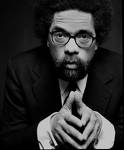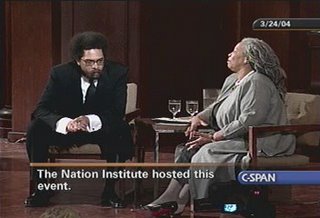Part I: Cornel West, Alice Coltrane Quartet, and perplexity(aka living and dying by degrees)

Lately I've become highly suggestable, musically speaking. A friend recommended a few slide guitarists for me to listen to, and the next thing I know I'm listening to slide non-stop , and doing my own research digging through Son House (pictured left), Fred McDowell (my current fav, pictured below right, along with Sonny Landreth's live version of his own "Broken Hearted Road"), and Robert Johnson, etc. Next Mendi mentions Ornette Coleman, right before I'm reading about him for my studies and bam, I'm listening to him over and over trying to understand his changes--moves through different tonics--challenging. Next I go see Cornel West at the inaugural Toni Morrison Lectures at
 Princeton University. In his second talk he speaks on the lost art of dialogue, and touches on how this happens in jazz improvisation and that he's going to see Alice Coltrane play with her son Ravi Coltrane and listen to them dialogue, neither of them completely knowing what will occur but dialoging with each other. I found out that thusfar Alice Coltrane only had three scheduled appearances in the US, the two other members of her quartet were Jack De Johnette (drums) and Charlie Haden (bass), and I was only an hour away from this one and I could do work on the train (part Daphne Brooks' excellent performance studies text Bodies in Dissent, part European experimental and improvisational composers). Plus I could get a student discount...OK, I'm there!
Princeton University. In his second talk he speaks on the lost art of dialogue, and touches on how this happens in jazz improvisation and that he's going to see Alice Coltrane play with her son Ravi Coltrane and listen to them dialogue, neither of them completely knowing what will occur but dialoging with each other. I found out that thusfar Alice Coltrane only had three scheduled appearances in the US, the two other members of her quartet were Jack De Johnette (drums) and Charlie Haden (bass), and I was only an hour away from this one and I could do work on the train (part Daphne Brooks' excellent performance studies text Bodies in Dissent, part European experimental and improvisational composers). Plus I could get a student discount...OK, I'm there! But wait, gotta say something about West whose talk was titled, "The Gifts of Black Folk in the Age of Terrorism." Being back in the NE has made me a bit cynical and I wondered, what he could possibly be talking about. This was West so it wasn't going to be some essentialist tale about how much stronger black folks are and thus better outfitted to survive this new age. OK then what was this gift that I should be prepared to receive, or had received and was capable of sharing? It was profound and yet obvious: once the the planes went down on September most white U.S. citizens experienced a siesmic shift in the way they viewed themselves vis-a-vis the rest of the world. They became aware that they were disliked, nay, hated, became aware that others might mean them harm, and lived in terror of that harm being randomly and brutally enacted. West at this point made the analogy that African Americans had been living as victims of domestic terrorism for several hundred years, living under the yoke of racism and in fear and in the aftermath of bodily, emotional and economic brutality. Yet there hadn't been a black Al Queda or a black Timothy McVeigh. (And despite some apparently rich years of black hires by Bell Labs there hasn't been a cell of black telecommunications experts hijacking communications systems and robbing white citizens of their civil liberties.) Why not?
But wait, gotta say something about West whose talk was titled, "The Gifts of Black Folk in the Age of Terrorism." Being back in the NE has made me a bit cynical and I wondered, what he could possibly be talking about. This was West so it wasn't going to be some essentialist tale about how much stronger black folks are and thus better outfitted to survive this new age. OK then what was this gift that I should be prepared to receive, or had received and was capable of sharing? It was profound and yet obvious: once the the planes went down on September most white U.S. citizens experienced a siesmic shift in the way they viewed themselves vis-a-vis the rest of the world. They became aware that they were disliked, nay, hated, became aware that others might mean them harm, and lived in terror of that harm being randomly and brutally enacted. West at this point made the analogy that African Americans had been living as victims of domestic terrorism for several hundred years, living under the yoke of racism and in fear and in the aftermath of bodily, emotional and economic brutality. Yet there hadn't been a black Al Queda or a black Timothy McVeigh. (And despite some apparently rich years of black hires by Bell Labs there hasn't been a cell of black telecommunications experts hijacking communications systems and robbing white citizens of their civil liberties.) Why not?West then took the audience through a multi-part answer of this question, four gifts which illuminated and exemplified the Greek principle of paideia, "the process of educating man [human beings] into his [his/her/hir] true form, the real and genuine human nature"-at least according to Wikipedia. According to West, quoting Socrates in quoted in Plato: "the unexamined life is not livable for a human being." And Malcolm X: "The examined life is painful", but nonetheless is essential. The title of the talk is a reference to W.E.B. DuBois less often cited text, The Gift of Black Folks, (written in 1924, twenty-one years after The Souls of Black Folks) which celebrates African American artistry and its offerings to US culture. West's intention is to discuss the philosophical gifts of black folks.
First Gift of Black Folks: Courage. Courage in the face of death which is the ultimate humility (letting go) or final human state. A few key quotes: West quoting poet William Cullen Bryant (1794–1878): "Truth, crushed to earth, shall rise again" from "The Battle-Field"; West himself on post-9/11 European American experience: "Am I witnessing the niggarization of the nation?...Subject to random and arbitrary violence and thoroughly hated for who they are..." West here talked about recognizing the Socratic as a grappling with life and death.
West identified a major point in this section as the example of Mamie Till Mobley, the mother of Emmett Till, a fourteen year old black boy brutally murdered in Mississippi in 1955 for allegedly whistling at a white woman (reports variously conjecture that Till was whistling to help him interrupt a stutter--on his mother's advice--something he regularly did with success, and alternately that he saw a bad checkerboard move and he was whistling in dismay at the player's choice). His mother stood over the his hideously deformed body, held in an open casket at her request ("let people see what they have done" she reportedly said) and declared: "I don't have a minute to hate; I'll pursue justice for the rest of my life." She did just that until her death at age 81, in 2003. Mobley outlived both of her son's self-confessed murderers.
Second Gift of Black Folks: Prophetic Witness in the name of love and justice. To go back to the example of Mrs. Mobley, Mamie Till Mobley said that in death her son Emmett told her to "continue to tell the story until men's consciousnesses will be aroused and justice will soon prevail. And I have been telling this story since 1955..." Here West also forwarded the notion of holding onto the democratic ideal. I think he also talked about faith at this point ('cause we need faith to keep holding to the democratic ideal).
Third Gift of Black Folks: That which shatters machines...The Blues. Some quotes: "...that folks have made dissonance a way of life"; "Life is dissonant all the way down. Learn how to live in a minor key"; "...blues sensibility, but it's tragic-comic to the core..." e.g. "Nobody Loves Me But My Mother, And She Might Be Jivin' Too". That's some comic hurt for real.

And on love: "Black people have been willing to speak publically about love" e.g. Martin Luther King, Jr., Marvin Gaye, James Baldwin, of course Toni Morrison, [etc.] (pictured right, Toni Morrison and Cornel West in discussion on race and politics in the US, presented by The Nation Institute at the New York Society for Ethical Culture March 24, 2004)
More on the Fourth Gift and the Alice Coltrane Quartet in Part II

4 Comments:
timberland outlet
lebron 14
burberry scarf
adidas stan smith
yeezy boost
adidas gazelle
pandora jewelry
prada sunglasses
pandora charms sale
nike polo
20170710
atlanta falcons jerseys
michael kors handbags outlet
fitflops sale
nike huarache
michael kors outlet
omega watches sale
ugg boots
ugg boots
ray ban sunglasses outlet
michael kors handbags
yeezy boost 350
fitflops sale clearance
michael kors outlet
adidas tubular
curry 2
adidas tubular UK
converse outlet store
adidas nmd
adidas ultra boost
tom ford sunglasses
zzzzz2018.6.22
moncler jackets
christian louboutin sale
ralph lauren uk
ray ban eyeglasses
super dry
nike factory outlet
superdry clothing
true religion outlet
ralph lauren uk
pandora charms
Post a Comment
<< Home